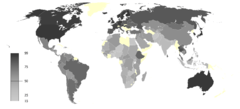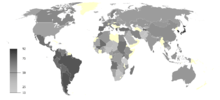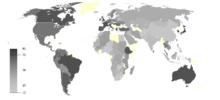Climate change opinion by country



Climate change opinion is the aggregate of public opinion held by the adult population. Cost constraints often restrict surveys to sample only one or two countries from each continent or focus on only one region. Because of differences among questions, wording, and methods—it is difficult to reliably compare results or to generalize them to opinions held worldwide.
In 2007–2008, the Gallup Poll surveyed individuals from 128 countries in the first comprehensive study of global opinions. The Gallup Organization aggregated opinion from the adult population fifteen years of age and older, either through the telephone or personal interviews, and in both rural and urban areas except in areas where the safety of interviewer was threatened and in scarcely populated islands. Personal interviews were stratified by population size or geography and cluster sampling was achieved through one or more stages. Although error bounds vary, they were all below ±6% with 95% confidence.
Weighting countries to a 2008 World Bank population estimate, sixty-one percent of individuals worldwide were aware of global warming, developed countries more aware than developing, with Africa the least aware. The median of people perceiving it as a threat was 47%. Latin America and developed countries in Asia led the belief that climate change was a result of human activities, while Africa, parts of Asia and the Middle East, and countries from the Former Soviet Union led in the opposite. Awareness often translates to concern, although of those aware, individuals in Europe and developed countries in Asia perceived global warming as a greater threat than others.
Table
- Knowing "something" or a "great deal" about global warming when asked "How much do you know about global warming or climate change?"
- Caused by human activity
- Responding yes when asked, "Temperature rise is part of global warming or climate change. Do you think rising temperatures are [...] a result of human activities?" Note: the other answer option was "a result of natural causes," but respondents were also allowed to indicate "both" (or "no opinion"). People voting "both" are not included in the numbers.
- Perceived as threat
- Responding that global warming is a serious personal threat.
Unless referenced otherwise, all data is from the 2007–2008 Gallup poll mentioned earlier.
External links
- Fewer Americans, Europeans View Global Warming as a Threat Gallup Poll April 20, 2011
- Poll results on the question "The climate change we are currently seeing is largely the result of human activity" Global Trend Survey 2014
References
Further reading
- Erika Bolstad (March 1, 2017). "Maps Show Where Americans Care about Climate Change; The updated Yale Climate Opinion maps suggest Americans' opinions on climate change differ sharply from that of the president". ClimateWire. Retrieved March 20, 2017 – via Scientific American.
- Pugliese, Anita; Ray, Julie (22 Sep 2009). "A Heated Debate: Global Attitudes Toward Climate Change". Harvard International Review. Retrieved 19 Jan 2010. (Subscription required (help)).
- Pelham, Brett (22 Apr 2009). "Awareness, Opinions About Global Warming Vary Worldwide". Gallup. Retrieved 22 Dec 2009.
- Pugliese, Anita; Ray, Julie (7 Dec 2009). "Top-Emitting Countries Differ on Climate Change Threat". Gallup. Retrieved 22 Dec 2009.
- Pugliese, Anita; Ray, Julie (11 Dec 2009). "Awareness of Climate Change and Threat Vary by Region". Gallup. Retrieved 22 Dec 2009.
- World Development Indicators database (15 Sep 2009). "Population 2008" (PDF). World Bank. Retrieved 18 Jan 2010.